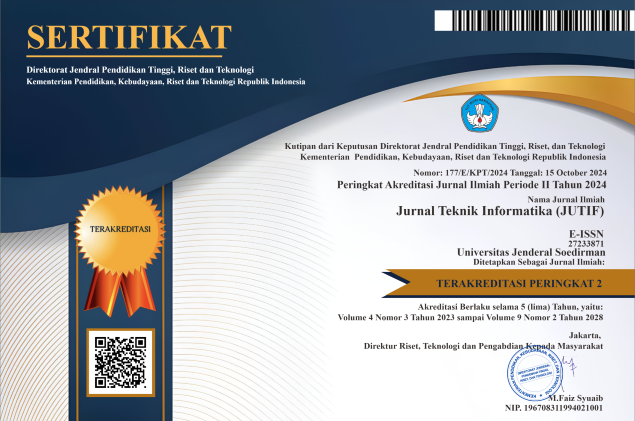COMPARISON OF ACCURACY OF VARIOUS TEXT CLASSIFICATION METHODS IN SENTIMENT ANALYSIS OF E-STAMPS AT X
DOI:
https://doi.org/10.52436/1.jutif.2025.6.1.3999Keywords:
e-meterai, Analisis Sentimen, ModelingAbstract
In the rapidly evolving digital era, technological innovations are applied in various fields, including law and administration, to improve the efficiency and effectiveness of processes. One of the latest innovations in Indonesia is the implementation of e-metals, which is designed to facilitate legal and secure electronic transactions, and meet the needs of a society that is increasingly dependent on digital technology. Although e-stamps aim to improve efficiency and security in transactions, there are still various perceptions from the public that reflect their views and experiences regarding the implementation of this technology. In this case, sentiment analysis is an effective method to evaluate public opinion generated from text data, such as user reviews and comments on social media. This research aims to analyze the sentiment towards e-metallocations in X app, using text classification methods to separate positive and negative sentiments. After collecting 3282 datasets and performing preprocessing that includes case folding, data cleaning, tokenizing, and stemming, the evaluation results show that the Naive Bayes (GNB) model achieves 96.65% accuracy on training data and 95.28% on testing data. On the other hand, the Support Vector Machine (SVM) model recorded an accuracy of 98.32% on training data and 96.80% on testing data. Meanwhile, the Random Forest model showed a perfect accuracy of 100% on training data and 99.09% on testing data, making it the highest performing model among the three methods tested.
Downloads
References
F. F. Mailoa, “analisis sentimen data twitter menggunakan metode text mining tentang masalah obesitas di indonesia,” J. Inf. Syst. Public Heal., vol. 6, no. 1, p. 44, 2021, doi: 10.22146/jisph.44455.
Y. Yusra and M. Fikry, “Klasifikasi Tweet E-Commerce dengan Menggunakan Metode Support Vector Machine,” J. CoreIT J. Has. Penelit. Ilmu Komput. dan Teknol. Inf., vol. 4, no. 2, p. 50, 2018, doi: 10.24014/coreit.v4i2.5205.
W. Ningsih, B. Alfianda, R. Rahmaddeni, and D. Wulandari, “Perbandingan Algoritma SVM dan Naïve Bayes dalam Analisis Sentimen Twitter pada Penggunaan Mobil Listrik di Indonesia,” MALCOM Indones. J. Mach. Learn. Comput. Sci., vol. 4, no. 2, pp. 556–562, 2024, doi: 10.57152/malcom.v4i2.1253.
Ardiyansah and Parjito, “Perbandingan Metode Naïve Bayes dan Support Vector Machine Dalam Analisis Sentimen Terhadap Tokoh Publik,” Media Online), vol. 4, no. 6, pp. 2813–2821, 2024, doi: 10.30865/klik.v4i6.1928.
A. Miftahusalam, A. F. Nuraini, A. A. Khoirunisa, and H. Pratiwi, “Perbandingan Algoritma Random Forest, Naïve Bayes, dan Support Vector Machine Pada Analisis Sentimen Twitter Mengenai Opini Masyarakat Terhadap Penghapusan Tenaga Honorer,” Semin. Nas. Off. Stat., vol. 2022, no. 1, pp. 563–572, 2022, doi: 10.34123/semnasoffstat.v2022i1.1410.
S. Rita and A. Pambudi, “Penggunaan Support Vector Machine Untuk Analisis Sentimen Ulasan Aplikasi Truecaller Dan Getcontact Using Support Vector Machine for Sentiment Analysis of Truecaller and Getcontact App Reviews,” vol. 20, no. 2, pp. 131–140, 2023.
D. Duei Putri, G. F. Nama, and W. E. Sulistiono, “Analisis Sentimen Kinerja Dewan Perwakilan Rakyat (DPR) Pada Twitter Menggunakan Metode Naive Bayes Classifier,” J. Inform. dan Tek. Elektro Terap., vol. 10, no. 1, pp. 34–40, 2022, doi: 10.23960/jitet.v10i1.2262.
Y. Ansori and K. F. H. Holle, “Perbandingan Metode Machine Learning dalam Analisis Sentimen Twitter,” J. Sist. dan Teknol. Inf., vol. 10, no. 4, p. 429, 2022, doi: 10.26418/justin.v10i4.51784.
F. A. Larasati, D. E. Ratnawati, and B. T. Hanggara, “Analisis Sentimen Ulasan Aplikasi Dana dengan Metode Random Forest,” … Teknol. Inf. dan …, vol. 6, no. 9, pp. 4305–4313, 2022, [Online]. Available: http://j-ptiik.ub.ac.id
A. P. Giovani, A. Ardiansyah, T. Haryanti, L. Kurniawati, and W. Gata, “Analisis Sentimen Aplikasi Ruang Guru Di Twitter Menggunakan Algoritma Klasifikasi,” J. Teknoinfo, vol. 14, no. 2, p. 115, 2020, doi: 10.33365/jti.v14i2.679.
W. Hidayat, M. Ardiansyah, and A. Setyanto, “Pengaruh Algoritma ADASYN dan SMOTE terhadap Performa Support Vector Machine pada Ketidakseimbangan Dataset Airbnb,” Edumatic J. Pendidik. Inform., vol. 5, no. 1, pp. 11–20, 2021, doi: 10.29408/edumatic.v5i1.3125.
V. Sari, F. Firdausi, and Y. Azhar, “Perbandingan Prediksi Kualitas Kopi Arabika dengan Menggunakan Algoritma SGD, Random Forest dan Naive Bayes,” Edumatic J. Pendidik. Inform., vol. 4, no. 2, pp. 1–9, 2020, doi: 10.29408/edumatic.v4i2.2202.
V. I. Santoso, G. Virginia, and Y. Lukito, “Penerapan Sentiment Analysis Pada Hasil Evaluasi Dosen Dengan Metode Support Vector Machine,” J. Transform., vol. 14, no. 2, p. 72, 2017, doi: 10.26623/transformatika.v14i2.439.
D. Ahmad Dzulhijjah, H. Sanjaya, A. Said Wahyudi Hidayat, A. Yulistia Alwanda, and E. Utami, “Perbandingan Metode Random Forest dan KNN pada Analisis Sentimen Twitter Review BCA Mobile,” Smart Comp Jurnalnya Orang Pint. Komput., vol. 12, no. 3, pp. 767–772, 2023, doi: 10.30591/smartcomp.v12i3.5106.
D. A. Faroek, M. Yusuf, and G. Syatauw, “Analisis Sentimen Terhadap Popularitas Partai Pendukung Capres 2024 Di Twitter Menggunakan Algoritma Naïve Bayes Classifier,” J. Ilm. Tek. Inform., vol. 17, no. 2, pp. 216–226, 2024.
K. S. Putri, I. R. Setiawan, and A. Pambudi, “Analisis Sentimen Terhadap Brand Skincare Lokal Menggunakan Naïve Bayes Classifier,” Technol. J. Ilm., vol. 14, no. 3, p. 227, 2023, doi: 10.31602/tji.v14i3.11259.
Sri Diantika, Windu Gata, and Hiya Nalatissifa, “Komparasi Algoritma SVM Dan Naive Bayes Untuk Klasifikasi Kestabilan Jaringan Listrik,” Elkom J. Elektron. dan Komput., vol. 14, no. 1, pp. 10–15, 2021, doi: 10.51903/elkom.v14i1.319.
A. S. Rahayu, A. Fauzi, and R. Rahmat, “Komparasi Algoritma Naïve Bayes Dan Support Vector Machine (SVM) Pada Analisis Sentimen Spotify,” J. Sist. Komput. dan Inform., vol. 4, no. 2, p. 349, 2022, doi: 10.30865/json.v4i2.5398.
M. I. Fikri, T. S. Sabrila, Y. Azhar, and U. M. Malang, “Comparison of the Naïve Bayes Method and Support Vector Machine on Twitter Sentiment Analysis,” SMATIKA J. STIKI Inform. J., vol. 10, no. 2, pp. 71–76, 2020.
A. Sudrajat, N. Mulyani, and N. Marpaung, “Sistem Pendukung Keputusan Penentuan Kelayakan Penangguhan Kredit Nasabah menggunakan Naïve Bayes,” Edumatic J.Pendidik. Inform., vol. 6, no. 2, pp. 205–214, 2022, doi: 10.29408/edumatic.v6i2.6298.


























